Disney and YouTube Drop PewDiePie
 With 53 million followers, Felix Kjellberg, known as PewDiePie, is YouTube's most popular star, but the video channel and Disney have cut ties with him after an egregious stunt. On the app Fiverr, people are paid $5 to do crazy things, but this time it went too far.
With 53 million followers, Felix Kjellberg, known as PewDiePie, is YouTube's most popular star, but the video channel and Disney have cut ties with him after an egregious stunt. On the app Fiverr, people are paid $5 to do crazy things, but this time it went too far.
Two South Asian men carried a sign that read, "Death to all Jews." Kjellberg is shown watching the video with his hand over his mouth. A Wall Street Journal report uncovered additional videos showing Nazi symbols and anti-Semitic jokes connected to the YouTube personality. 
YouTube canceled Kjellberg's second season, and Maker Studios, a division of Disney, told Variety: "Although Felix has created a following by being provocative and irreverent, he clearly went too far in this case and the resulting videos are inappropriate. Maker Studios has made the decision to end our affiliation with him going forward."
In a YouTube video, the men who held the saying apologized and pleaded to get back their Fiverr account, which had been suspended. In a blog post, Kjellberg responded to the controversy.
Discussion:
- Did YouTube and Maker Studio do the right thing? Why or why not?
- For Disney, connections to Kjellberg seemed risky to begin with, even for potentially 53 million followers. What do you think?
- What's your view of Kjellberg's response? Do you believe his argument?
Former Starwood Exec Comments on the Acquisition
 Former head of global development at Starwood Hotels & Resorts Worldwide Simon Turner talks openly at The Americas Lodging Investment Summit (ALIS) conference. In an interview, Turner acknowledges that in any acquisition, like the Marriott's purchase of Starwood, not everyone is going to still have a job.
Former head of global development at Starwood Hotels & Resorts Worldwide Simon Turner talks openly at The Americas Lodging Investment Summit (ALIS) conference. In an interview, Turner acknowledges that in any acquisition, like the Marriott's purchase of Starwood, not everyone is going to still have a job.
Turner discusses the uncertainly, particularly with the last-minute bid from Anband Insurance, and the value of overcommunicating to avoid confusion.
Turner also describes the process and his feelings of attachment towards the people in his organization, which helped him avoid feeling "woe is me." He also had perspective considering some people spent their entire career at Starwood compared to his nine years.
In talking about the hotel business, Turner says, although executives compete with each other, there is a sense of camaraderie and respect, which Turner calls "one of the great things about our business."
Discussion:
- What does Turner mean at the beginning when he jokes, "I'm a cost synergy"?
- What lessons can we learn from Turner's views on communication?
- What's your view of Turner's perspective on the hotel business? Do you think this is true of some industries more than others? Why or why not?
Merriam-Webster Tweets
 Business Insider has compiled a bunch of Merriam-Webster tweets about the Trump Administration and its use of language. The video, titled "Merriam-Webster can't stop trolling the Trump administration on Twitter," presents several examples:
Business Insider has compiled a bunch of Merriam-Webster tweets about the Trump Administration and its use of language. The video, titled "Merriam-Webster can't stop trolling the Trump administration on Twitter," presents several examples:
- Highlighted the word most often looked up in November: fascism
- Clarified the difference between "historic" and "historical," a word incorrectly used by Secretary of Education Betsy deVos
- Noted that the Holocaust refers "to the Nazis' mass murder of European Jews" after The White House neglected to mention Jews in the International Holocaust Rememberance Day statement
- Defined "betrayal" after Sean Spicer said he wouldn't define the word during a press conference.
And more.
Discussion:
- What's implied in Business Insider's report? Is this a criticism? I'm not sure.
- How helpful do you find Merriam-Webster's tweets? Some are clarifying and some are not.
Fallacies in Recent Politics
 I'm teaching a module on fallacies on Monday and will present a few related to politics-wish me luck:
I'm teaching a module on fallacies on Monday and will present a few related to politics-wish me luck:
- Ad hominen: President Trump's tweets are an obvious example, but I'll use Hillary Clinton's "basket of deplorables" for this example. It's an attack without evidence.
If it's not too charged (and a bit complicated), I may talk about Senator Elizabeth Warren's reading of Coretta Scott King's 1986 letter about Jeff Sessions, the attorney general nominee. An LA Times opinion piece explains the ad hominen issue well:
"The original intent of the rule, if you will, was to preserve comity and focus the attention senators on substance rather than ad hominem arguments. But Warren was commenting on Sessions not as a colleague but as the nominee to a position in the executive branch; his character (as perceived by Mrs. King) was central to her argument."
- False analogy: This one will be a question to students. Nordstrom dropped Ivanka Trump's brand, and President Trump criticized the decision on Twitter (although The Wall Street Journal reports a 32% sales decline). This may have been an ethics violation itself, but the false analogy came in the reporting. Kellyanne Conway was charged with an ethics violation for, as a member of the White House staff, promoting Ivanka Trump's products on Fox & Friends:
"Go buy Ivanka's stuff, is what I was [saying] - I hate shopping and I'm going to go get some myself today."
"This is just...it's a wonderful line. I own some of it... I'm going to give a free commercial here. Go buy it today, everybody. You can find it online."
A Breitbart article agrees with the charges, but is this "wildly disproportionate"? The article discusses a SiriusXM interview and includes a few comparisons to democrats' promoting for-profit companies:
"Obama administration directly involved government in vastly larger business dealings, most dramatically by using the Internal Revenue Service to force Americans to buy products from preferred insurance companies under Obamacare."
"President Obama's pushing green energy technology and electric cars, such as the Chevy Volt."
"...Clintons' case...pushing the Clinton Foundation and using their government power to get people to donate to the Clinton Foundation as a form of quasi-bribery."
Are Verizon and T-Mobile Going Too Far on Twitter?
 T-Mobile's sex-themed commercial continued on Twitter with the company trading barbs with Verizon, the ad target. Actress Kristen Schaal stars in the ad and seemed to enjoy being "punished" by Verizon for going over her data plan.
T-Mobile's sex-themed commercial continued on Twitter with the company trading barbs with Verizon, the ad target. Actress Kristen Schaal stars in the ad and seemed to enjoy being "punished" by Verizon for going over her data plan.
Some thought the ad was cute, but the tweets seemed to get out of hand. A Mashable article sums it up well: "It was all pretty creepy coming from the marketing departments of two of America's biggest telecoms. And most Twitter users were not having it." Tweets encouraged the companies to end it:
- "K guys. This has OFFICIALLY gone too far."
- "50 Shades of Don't"
T-Mobile CEO John Legere is known for some outlandish behavior. A CNBC article this month calls his behavior "authentic," for example using the "f-bomb," and Legere explains why he is the way he is:
"The trick for me is, I really believe that I act, behave, and speak the same way my customers do. I say what they think on behalf of them. If you look, most of my colorful nature and antics is to drive change that benefits customers."
Discussion:
- Do you find the commercial itself funny?
- What's your view of the ongoing exchange between Verizon and T-Mobile? In this case, was it worth the risk of offending?
Bud Light's Risky Super Bowl Ad
The commercial garnered 21 million YouTube views so far, and #BoycottBudweiser is trending. Maybe it's a successful ad?
News of Bud Light's new advertising approach-no celebrities-before the Super Bowl: on January 18, a Wall Street Journal article described the storyline, but the immigration focus was not clear:
The Budweiser spot, which is being created by Anomaly, will highlight the pursuit of the American dream by focusing on Adolphus Busch, the co-founder of Anheuser-Busch. The famous Clydesdale horses, long a fixture of Bud advertising for the title game, will make a cameo.
The commercial is called "Born the Hard Way," and the YouTube caption reads, "This is the story of our founder's ambitious journey to America in pursuit of his dream: to brew the King of Beers." But the commercial's tone and underlying message seemed to oppose President Trump's recent ban on travel and immigration from Muslim-majority countries.
Budweiser is no stranger to controversy: the company's "up for whatever" campaign offended many as insensitive to sexual assault. This time, some tweets criticized the spelling, while others showed their support of a boycott.
Discussion:
- What consideration, if any, do you think Budweiser gave to the possibility of boycotts by Trump supporters?
- Was the risk worth it? Take a look at the social chatter and mainstream articles.
Ralph Lauren Loses CEO and Value
 Ralph Lauren CEO Stefan Larsson resigned over what the Chicago Tribune calls a "creative clash" with the company founder. The company is struggling to maintain sales as its preppy style appeals to an older crowd, and the brand hasn't found a way to attract new customers.
Ralph Lauren CEO Stefan Larsson resigned over what the Chicago Tribune calls a "creative clash" with the company founder. The company is struggling to maintain sales as its preppy style appeals to an older crowd, and the brand hasn't found a way to attract new customers.
In a statement, founder Ralph Lauren said, "We both recognize the need to evolve. However, we have found that we have different views on how to evolve the creative and consumer-facing parts of the business. After many conversations with one another, and our board of directors, we have agreed to part ways."
In retrospect, perhaps Larsson was a tough fit: he came from Old Navy, which is a budget brand. He was quoted in the company's press release: "In June, we announced a plan to refocus the Company on what made it iconic, evolve that for today and build our brand to its full potential. That plan is on track—I am proud of the progress the whole team has made and I am committed to ensuring its uninterrupted execution. Ralph will always be an inspiration to me, and I am grateful to have had this experience."
Lauren also said, "The board and I are committed to the execution of the Way Forward Plan and continuing to move our business and iconic brand forward."
The stock fell 12% after the news was announced.
Discussion:
- Read Ralph Lauren's press release. How well does the message convey what happened? Does reading the release enhance or diminish the image of the brand in your eyes?
- Assess Larsson's quotation in the release. How well does he explain his own performance while maintaining the company's brand?
Trump Management: A Case Study
 The New York Times asked business and management experts how well President Trump is shaping up to be a leader. The results aren't too good.
The New York Times asked business and management experts how well President Trump is shaping up to be a leader. The results aren't too good.
The article cites a Wall Street Journal conservative op-ed:
The conservative editorial page of The Wall Street Journal bemoaned a refugee policy "so poorly explained and prepared for, that it has produced confusion and fear at airports, an immediate legal defeat, and political fury at home and abroad."
An assistant professor of organizational behavior at Stanford said Trump should take her introductory MBA course, while a professor said his actions "are so far from any responsible management approach." Jeffrey Polzer, an HR professor at Harvard said, "It's really common sense: You want to surround yourself with talented people who have the most expertise, who bring different perspectives to the issue at hand. Then you foster debate and invite different points of view in order to reach a high-quality solution."
Polzer also said that a better approach "requires an openness to being challenged, and some self-awareness and even humility to acknowledge that there are areas where other people know more than you do. This doesn't mean decisions are made by consensus. The person at the top makes the decisions, but based on the facts and expertise necessary to make a good decision."
Discussion:
- What's your view of how President Trump has been running the country so far?
- Where's the disconnect? Compare the complexity of running a country and an executive branch of government to running a complex business.
- Maybe this is an adjustment period. Perhaps Trump needs some time to orient himself and adapt his management style. Try to make a case for this line of thinking if it's not your current view.
NFL Rejects GNC Ad
 GNC, the vitamin store company, is trying to improve its image, but the company won't get a spot in this year's Super Bowl. Although Fox News accepted the ad, the NFL pulled the plug.
GNC, the vitamin store company, is trying to improve its image, but the company won't get a spot in this year's Super Bowl. Although Fox News accepted the ad, the NFL pulled the plug.
According to AdAge, "Jeff Hennion, exec VP-chief marketing and e-commerce officer at GNC, said the NFL objected to its commercial because fewer than 3% of its products include two of the 162 substances banned by the league. According to Mr. Hennion, the NFL has approval rights over commercials in the big game." NFL also wanted GNC to change its logo, which has the name on a pill bottle. The company was working on that, but the commercial was still rejected.
Discussion:
- Why do you think the NFL rejected GNC's ad? Is it about the banned substances or something else? Related question: What's your view of the ad?
- I can't find a statement from the NFL. Should the company make a comment? What are the advantages and potential downsides?
- GNC makes an interesting argument with the 3% claim. Do you find it convincing? Consider principles from Chapter 9.
Users #DeleteUber
Uber users aren't happy with the company's surge pricing during a New York City taxi protest. NYC yellow cabbies delayed JFK airport pickups for an hour to protest President Trump's ban on travel from predominantly Muslim countries.
Trouble started for Uber when its pricing tool showed higher prices because of the shortage. Uber says it was automatic-not intended to take advantage of the taxi drivers' decision. The company also suspended the surge but not before #DeleteUber started trending.
Meanwhile, Uber CEO Travis Kalanick posted a call for support for drivers affected by the ban on his Facebook page.
A Yahoo story, "The Day Lyft Was Bigger than Uber," explains that some users have been favoring Lyft since Kalanick joined Trump's advisory board, while others became fans when Lyft donated $1 million to the American Civil Liberties Union (ACLU), which has been at the forefront fighting the president's new policies. The uptick for Lyft was significant: "... data from third-party app tracking firm App Annie indicates Lyft surpassed Uber in the US on Sunday for most app downloads on iOS in the US in a single day - more than twice the number of times people downloaded Lyft just two weeks prior. Downloads for the Android version of Lyft's app in the Google Play store also saw a significant boost that day."
Discussion:
- Some say boycotting Uber isn't the best way to protest, particularly because the CEO is against the president's actions. What do you think?
- Assess Kalanick's statement on his Facebook page. What are his key messages?
- How do you feel about Uber? Do you buy the argument that the surge pricing wasn't capitalizing on the taxi protest?
CEOs Respond to Trump's Executive Order
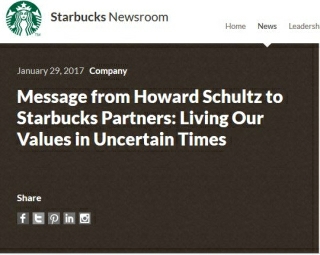 The New York Times reports "Frantic Phoning Among CEOs" about how they should address President Trump's ban on travel from Muslim-majority countries. Leaders want to oppose the ban but are concerned about "poking the bear," according to the article. The new president has taken tweet jabs at others, for example, the union leader involved in Carrier negotiations when he spoke out.
The New York Times reports "Frantic Phoning Among CEOs" about how they should address President Trump's ban on travel from Muslim-majority countries. Leaders want to oppose the ban but are concerned about "poking the bear," according to the article. The new president has taken tweet jabs at others, for example, the union leader involved in Carrier negotiations when he spoke out.
In a statement on the Starbucks website, Schultz opposed initiatives around DACA, building a wall, the Affordable Care Act, and immigration. He pledged to employ 10,000 refugees.
Mark Zuckerberg and Tim Cook also have come forward. Cook focused on Apple, of course: "In my conversations with officials here in Washington this week, I've made it clear that Apple believes deeply in the importance of immigration - both to our company and to our nation's future. Apple would not exist without immigration, let alone thrive and innovate the way we do." Other tech company leaders have weighed in their opposition: Airbnb, Uber, Lyft, Facebook, Google, Apple, Amazon, Expedia, and Microsoft.
The Times called financial firms' response more "moderate." For example, Lloyd Blanfein of Goldman Sachs said, "For us to be successful, our men and women must reflect the diversity of the communities and cultures in which we operate. That means we must attract, retain and motivate people from many backgrounds and perspectives. Being diverse is not optional; it is what we must be."
The article also noted energy and heavy industries' "mixed-bag" response, consumer and retail companies' resistance, and media and telecom's "no comment."
Discussion:
- What risks and rewards do CEOs face in addressing the travel ban?
- Why are industries responding differently? What does each have to lose or gain?
- Assess Howard Schultz's statement. While others are questioning how and whether to respond, he is on it. Why?
Kraft Heinz Gets Mixed Reviews for Holiday
 Kraft Heinz won't have a commercial in this year's Super Bowl, but the company will give employees Monday off. Joking that the day after, #SMunday, should be a national holiday, Heinz started a petition on change.org:
Kraft Heinz won't have a commercial in this year's Super Bowl, but the company will give employees Monday off. Joking that the day after, #SMunday, should be a national holiday, Heinz started a petition on change.org:
"We can all agree that going to work the Monday after the ‘Big Game' on Sunday is awful," the petition states. "So as far as we're concerned at Heinz, we as a nation should stop settling for it being the worst work day of the year. We don't settle for that awesome football Sunday to be just like every other day of the year."
They're certainly getting mainstream press, for example, in The Washington Post, but the article refers to the move as a "Super Bowl stunt."
The company recently laid off thousands of workers, and the day off isn't available to factory employees. Some social posts call the campaign "pandering" and one tweet reads, "I think we have bigger things to worry about."
Discussion:
- What's your view of the campaign: pandering, clever, inappropriate, or something else?
- What about the timing? News from the Trump Administration is heavy is week.
Dippin' Dots Responds to Spicer
 White House Press Secretary Sean Spicer has periodically blasted Dippin' Dots via tweets over the years. Now the company has responded in an open letter.
White House Press Secretary Sean Spicer has periodically blasted Dippin' Dots via tweets over the years. Now the company has responded in an open letter.
In an NPR interview, the CEO of the ad agency said they were concerned about getting in the political mix, but people were expecting the company to respond, so they had little choice. The company executives decided how to respond: "Scott Fischer, the CEO of Dippin' Dots, and his executive team wanted to openly address the issue in a way which was transparent and stayed true to their brand values – fun, community, and camaraderie."
Dippin' Dots offered to serve the White House and press, but Spicer suggested treating the military and first responders. It's not clear how this might happen.
Discussion:
- How well did Dippin' Dots handle the situation? What were the risks?
- It sounds as though Dippin' Dots responded because of the social outcry. Should the company have jumped into the conversation with Spicer earlier? How could they have done this?
VW Culture Change Agent Resigns
 About a year after she was hired, the Volkswagen head of compliance has left "by mutual agreement." A New York Times article reports that Christine Hohmann-Dennhardt, previously at Daimler, joined the board in January 2016 and "was responsible for integrity and legal affairs." The article further reports on the significance of her hire and departure:
About a year after she was hired, the Volkswagen head of compliance has left "by mutual agreement." A New York Times article reports that Christine Hohmann-Dennhardt, previously at Daimler, joined the board in January 2016 and "was responsible for integrity and legal affairs." The article further reports on the significance of her hire and departure:
Volkswagen presented Ms. Hohmann-Dennhardt's departure as one that was mutually agreed on. But the loss of a rare outsider in the top ranks underscores the insular nature of the company.
Its stock is held by a small number of shareholders: Two families, a German state and the government of Qatar jointly hold about 90 percent of Volkswagen shares. That leaves outside investors with little voice and results in a management board typically made up of insiders with a long track record at the carmaker.
Ms. Hohmann-Dennhardt had been an exception.
"No matter what spin they put on" her departure, said Jeff Thinnes, a former Daimler executive who advises European companies on compliance and ethics issues, "the optics couldn't be worse."
A statement on VW's website compliments Hohmann-Dennhardt's contributions: "The Supervisory Board thanks Dr. Hohmann-Dennhardt for contributing her outstanding expertise and experience to achieving important milestones, and for supporting the Group in revising its internal guidelines and procedures." The company also promises ongoing changes:
Volkswagen will continue to press forward with changes to its way of thinking and working. The Group has substantially elevated its commitment to working ethically and with integrity and is decentralizing its organization. Brands and regions already have much more autonomy with regard to their operating business. These and other initiatives are part of a broader transformation of Volkswagen's corporate culture to create a more entrepreneurial and international organization.
Discussion:
- Some hires just don't work out. What do you think happened here?
- How well did VW handle the messaging? Read the full statement.
- To what extent do you agree with the Times' assessment? Did the article overstate the damage of Hohmann-Dennhardt's termination?
Boeing Profits Up
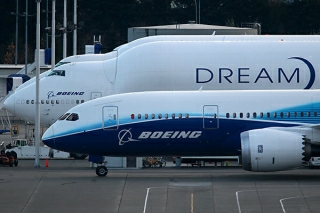 After facing critical tweets from President Trump about its expensive military planes, Boeing reports quarterly profits better than expected. But the uptick is from commercial plans, a market Boeing is leading.
After facing critical tweets from President Trump about its expensive military planes, Boeing reports quarterly profits better than expected. But the uptick is from commercial plans, a market Boeing is leading.
Boeing's fourth-quarter press release included a few cheery statements from Chairman, President and Chief Executive Officer Dennis Muilenburg:
"With solid fourth quarter operating performance and a sharp strategic focus, we extended our aerospace market leadership in our centennial year and positioned Boeing for continued growth and success in our second century."
"We led the industry in commercial airplane deliveries for the fifth consecutive year, achieved healthy sales in our defense, space and services segments, and produced record operating cash flow, which fueled investment in innovation and our people and generated significant returns to shareholders."
"Looking forward, our team is intent on accelerating productivity and program execution to deliver increasing cash and profitability from our large and diverse order backlog of nearly $500 billion, standing up our new integrated services business, and capturing an even greater share of the the growing global aerospace market to deliver superior value to our customers, shareholders and employees."
Bloomberg reports Boeing shares at record high and that the "787 Dreamliner emerged from a decade of losses." The article quotes an analyst: "We think this release is pretty boring -- and boring is good."
But Fortune warns, "Its overall outlook for 2017, however, is not likely to inspire confidence. Boeing is calling for adjusted earnings between $9.10 and $9.30 this year, which is below the $9.31 that Wall Street analysts were projecting. The company expects revenue will fall to somewhere between $90.5 billion and $92.5 billion, compared to $94.6 billion in 2016."
Discussion:
- We see a lot of jargon in the press release. Is it appropriate or off-putting?
- What does the analyst mean by the "release is pretty boring." Should it be more exciting? It is, after all, good news.
- What are the dangers of the Boeing CEO quotations being overly optimistic, as the Fortune article warns. What's the best approach here?
Uber Pays $20M for Misleading Drivers
 Uber has been in the news several times for questionable business practices. Now, the company will pay $20 million to drivers because of a suit by the US Federal Trade Commission.
Uber has been in the news several times for questionable business practices. Now, the company will pay $20 million to drivers because of a suit by the US Federal Trade Commission.
Ads on Craigslist and promotions on the Uber website boasted, "the potential income a driver on UberX can make in a year is more than $90,000 in New York and more than $74,000 in San Francisco." Boston drivers, Uber said, could make $25 per hour. But that is rarely the case: less than 10% of drivers in Boston earned that much, and drivers in NY and SF made, on average, $61,000 and $53,000.
Critics say Uber shifts risk and other expenses, such as car purchases, gas, and repairs to drivers, who don't reap the advertised benefits.
The company disputes how the FTC calculated income and responded to the settlement:
"We're pleased to have reached an agreement with the FTC
"We've made many improvements to the driver experience over the last year and will continue to focus on ensuring that Uber is the best option for anyone looking to earn money on their own schedule."
Discussion:
- What is your experience with Uber as a company? How does this news factor into your view of Uber?
- What could be the discrepancy between how Uber calculates income and how the FTC sees the situation? How credible do you find Uber's argument?
Analysis of Trump's Inauguration Speech
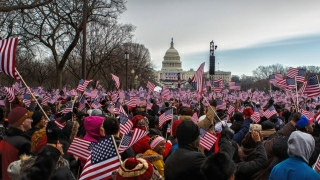 Both sides of the aisle seem to agree that President Trump's inaugural address was short and "militant," but analysts disagree on the effect.
Both sides of the aisle seem to agree that President Trump's inaugural address was short and "militant," but analysts disagree on the effect.
NPR's analysts comment on the speech line by line, with some taking issue with his points; for example, he discusses inequities, yet, as one reporter explains, "It's worth noting that despite Trump's anti-establishment message and his frequent promises during the campaign to "drain the swamp," Trump's Cabinet picks so far have included several billionaires and Washington and Wall Street insiders, including billionaire Betsy DeVos, former Goldman Sachs executive Steve Mnuchin, former Exxon Mobil chairman and CEO Rex Tillerson, and countless current and former elected officials."
Fox News host Bill O'Reilly lauds the president's speech, particularly his jabs at the Obama Administration. He also notes that the president criticized President George W. Bush's Iraq and Afghan wars:
"George W. Bush was seated just a few feet away from President Trump. So it's clear that Donald Trump has no sensitivity to the politics of the past, no matter who was in office. His message was directed to his supporters, to the folks, who are fed up with a political process they believe is not helping them."
O'Reilly called it "more like a campaign speech than a presidential address."
Discussion:
- What's your view of the speech? How do your political views influence your opinion?
- Analyze the language choices in Trump's speech. He uses several rhetorical devices.
How to Erase a CEO
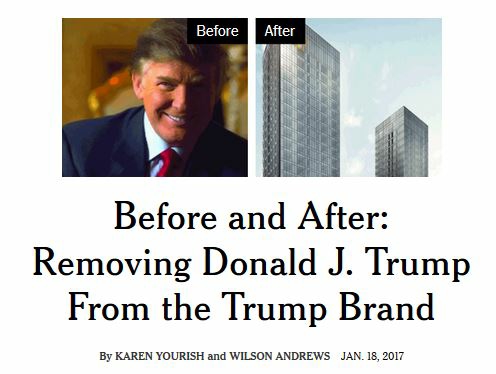 The Trump organization has revamped its websites to remove images of the President-Elect and his daughter, Ivanka. The New York Times shows several "before-and-after" screenshots of his company's websites. As Trump is in the midst of detaching himself from his businesses to avoid conflicts of interest, these changes seem to be mere gestures to some legal experts.
The Trump organization has revamped its websites to remove images of the President-Elect and his daughter, Ivanka. The New York Times shows several "before-and-after" screenshots of his company's websites. As Trump is in the midst of detaching himself from his businesses to avoid conflicts of interest, these changes seem to be mere gestures to some legal experts.
Norman Eisen, former chief White House ethics lawyer for President Obama, said, "The problem is, like all of the Trump conflict remedies, these are half-measures and Band-Aids that tape over a gaping wound. Until Mr. Trump definitively severs his ownership with these businesses, the conflicts and the myriad of controversies and risk of scandal and corruption that flow from them are going to continue unabated."
Still, the photos show dramatic differences for several Trump Towers and Trump Hotels, Trump International Realty, Trump.com, and Trump Golf.
Discussion:
- The Times article shows several Trump family images still on his websites. Should they all be removed? Try to argue both sides of this issue.
- Many images were removed in just the past two days, according to the Times article. Is the timing important for the imminent inauguration, or doesn't it matter?
- How do you think removing these images from these sites will affect the family businesses, if at all?
Diversity Training at Delta
 In response to two recent incidents, Delta crew members will attend diversity training that company executives already attended.
In response to two recent incidents, Delta crew members will attend diversity training that company executives already attended.
In one situation, CEO Ed Bastian banned a passenger after seeing a video of him yelling about Trump. In a statement, the company said the passenger should not have been allowed to fly. In another situation, covered by BizCom, an African-American doctor was questioned about her credentials and discouraged from helping a sick passenger.
The planned program includes unconscious bias and microaggressions-two current topics in diversity and inclusion circles. That's good because traditional diversity training programs haven't been found to be effective. A 2012 HBR article, "Diversity Training Doesn't Work," faults programs for causing more problems than they solve, and a 2016 BizCom story reiterated the point covered in a 2016 article.
Discussion:
- What's your view of diversity training programs? Are you skeptical like me?
- How could covering topics of unconscious bias and microaggressions be different?
- What difference do you think the training will make at Delta?
VW's Winterkorn Responds to Questions
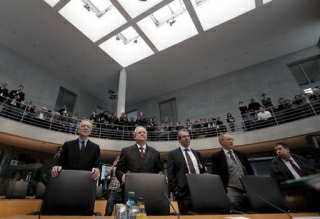 Martin Winterkorn, Volkswagen's former CEO, responded to what the The New York Times calls "polite grilling" by the German government about the emissions scandal.
Martin Winterkorn, Volkswagen's former CEO, responded to what the The New York Times calls "polite grilling" by the German government about the emissions scandal.
Winterkorn has a tough time defending himself when the company already admitted using software to cheat emissions tests. Several executives were indicted, including many who reported directly to him. As the Times reports, "Volkswagen's plea agreement with the Justice Department in Washington last week left no doubt that the fraud was the work of dozens, if not hundreds, of employees, rather than the result of a handful of rogue engineers as the company had first claimed."
But Winterkorn said he didn't know about the "defeat device" and "never did I have the impression that anyone was afraid to speak an open word with me." The Times article further questions the likelihood that Winterkorn knew nothing:
There is some reason to doubt Mr. Winterkorn's assertion. Mr. Gottweis, a Volkswagen executive who specialized in solving technical emergencies around the world, warned in a memo in May 2014 that American regulators were likely to investigate "whether Volkswagen implemented a test detection system in the engine control unit software (so-called defeat device)."
The memo was included in a stack of weekend reading given to Mr. Winterkorn at the time, but Volkswagen has said it was not clear if Mr. Winterkorn had read it. Mr. Gottweis reported directly to Mr. Winterkorn, however, and it is deemed unlikely that a warning from an executive known internally as "the fireman" would have been ignored.
Discussion:
- Do you believe Winterkorn's stance? Why or why not?
- How does Winterkorn benefit from continuing to deny knowledge of the defeat device? If he is lying, what are the potential consequences to him personally and professionally of admitting the truth?
- Some see this testimony as a missed opportunity for Volkswagen. Can you explain this point of view?























